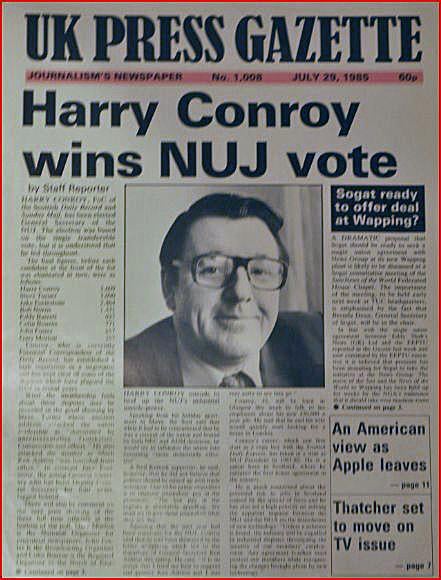
Obituary: Harry Conroy, former NUJ general secretary
The funeral of Harry Conroy, who died on his 45th wedding anniversary aged 67 after a short illness, was held in Cambuslang, Glasgow, on April 30, 2010.
Harry was a trade union leader and journalist. As general secretary of the National Union of Journalists (NUJ) from 1985 to 1990, he held centre stage in the dispute over Rupert Murdoch’s decision to move his newspaper titles from Fleet Street to Wapping in east London – and break the print unions.
Harry was born in the Glasgow suburb of Pollok to working-class Catholic parents and attended Lourdes secondary school in Cardonald, Glasgow. He left to work as a trainee laboratory technician in the Southern General Hospital before joining the Scottish Daily Express as a copy boy. His talent and energy were swiftly recognised and he became a journalist. In 1965, he married Margaret Craig.
By the time he rose to be financial correspondent at the Daily Record in 1969, he was deeply involved in the NUJ. He was not just the father of the chapel (shop steward) at the Record, but also the father of the joint chapel there, which included printers. \
By Harry’s own admission, for most of his life he led a Jekyll-and-Hyde existence, observing that by day he was a financial journalist interviewing leading capitalists and by night an active trade unionist and Labour Party activist.
Harry was also a member of the NUJ national executive and its president in 1981-82. He was known for hard bargaining with newspaper proprietors, especially Robert Maxwell, but they knew that if they could strike a deal with Harry, he would deliver it.
In 1985, Harry was elected general secretary of a union weakened by years of sectarian strife, and a demoralised head office and national executive. In five years, mostly by sheer force of personality, he restored unity and a sense of purpose, making the NUJ far better respected by employers and other trade unions.
But his efforts to build unity with the print unions against Murdoch failed. Harry went to the journalists on the Murdoch titles and begged them to refuse to go to Wapping. Once Murdoch had gobbled up the printers, journalists would be next on his menu, he said.
He was a leading advocate of closer relations with print unions, with a view to a merger, but both right and left wings within the NUJ resisted, and when Harry came up for re-election, they combined to defeat him narrowly.
After leaving the NUJ in 1990 Conroy, A Christian socialist, became campaign director of the cross-party, pro-devolution Scottish Constitutional Convention. But devolution, at least for another seven years, was not to be, and instead Conroy established a public relations consultancy, Conroy Associates, in 1992.
He also ghosted two political memoirs, the former Labour official Jimmy Allison’s Guilty By Suspicion (1995) and Tory MP Allan Stewart’s The Long March of the Market Men (1996), as well as writing his own memoirs, Off the Record: A Life in Journalism, in 1997. That same year he edited The People Say Yes: The Making of Scotland’s Parliament, and later They Rose Again (2003).
A keen stamp and postcard collector, as well as a Celtic supporter, Conroy remained a newspaper man at heart, editing the Scottish Catholic Observer from 2000 and producing business and financial columns for the Glasgow Herald and Evening Times.
The Catholic Observer rewarded his loyalty and talent in the same way as the NUJ had done: they parted in 2008. A lesser man might have been bitter. But Catholicism was the faith of Harry’s fathers, and socialism was the faith that he learned from the privations of his fathers, and it was inconceivable that he could ever abandon either of them. Harry saw his faith in a clear-sighted and sometimes alarmingly simple way. “The Pope says it’s OK, so it’s OK by me,” he would growl during our many disputes about religion.
For the last six months of Harry’s working life he was a Communications Officer with Victim Support Scotland.
Harry was the best of company, opinionated, loved a good argument but he was always the first to offer help to anyone in need. He was never in awe of anyone and treated everyone with the same respect and courtesy, regardless of their status.
He is survived by his wife Margaret, daughter Lynn and sons Ewan and Stuart.
David Sinclair is a former NUJ President and close friend of Harry Conroy.
Email pged@pressgazette.co.uk to point out mistakes, provide story tips or send in a letter for publication on our "Letters Page" blog
